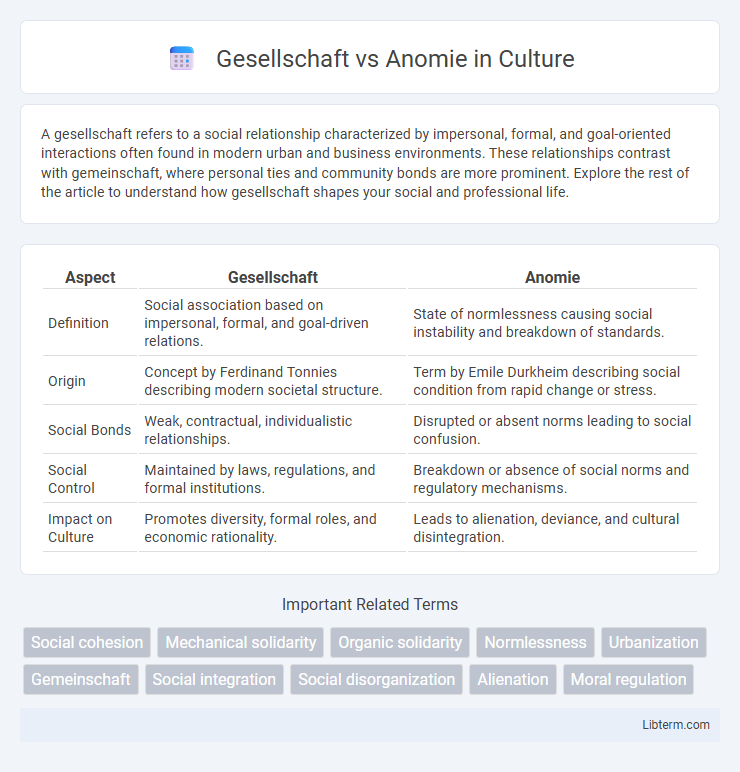A gesellschaft refers to a social relationship characterized by impersonal, formal, and goal-oriented interactions often found in modern urban and business environments. These relationships contrast with gemeinschaft, where personal ties and community bonds are more prominent. Explore the rest of the article to understand how gesellschaft shapes your social and professional life.
Table of Comparison
| Aspect | Gesellschaft | Anomie |
|---|---|---|
| Definition | Social association based on impersonal, formal, and goal-driven relations. | State of normlessness causing social instability and breakdown of standards. |
| Origin | Concept by Ferdinand Tonnies describing modern societal structure. | Term by Emile Durkheim describing social condition from rapid change or stress. |
| Social Bonds | Weak, contractual, individualistic relationships. | Disrupted or absent norms leading to social confusion. |
| Social Control | Maintained by laws, regulations, and formal institutions. | Breakdown or absence of social norms and regulatory mechanisms. |
| Impact on Culture | Promotes diversity, formal roles, and economic rationality. | Leads to alienation, deviance, and cultural disintegration. |
Understanding Gesellschaft: The Structure of Modern Societies
Gesellschaft refers to social relationships characterized by impersonal, formal, and contractual interactions typical of modern, urban societies. This structure emphasizes individual goals, roles, and self-interest, contrasting with Gemeinschaft's emphasis on close-knit, communal ties. Understanding Gesellschaft highlights how economic, legal, and bureaucratic systems organize social life in contemporary environments, influencing patterns of social cohesion and individual behavior.
Defining Anomie: Breakdown of Social Norms
Anomie refers to the breakdown or absence of social norms, leading to a state of normlessness where individuals feel disconnected from the collective conscience of society. Emile Durkheim introduced the concept to describe how rapid social change or crisis weakens the regulatory power of established norms, causing social instability and personal disorientation. This condition contrasts with Gesellschaft societies, characterized by formal social structures but often lacking cohesive moral guidance, thereby increasing the risk of anomie.
Historical Roots: From Gemeinschaft to Gesellschaft
The concepts of Gesellschaft and Anomie stem from the sociological examination of societal cohesion and change, with roots tracing to Ferdinand Tonnies' distinction between Gemeinschaft (community) and Gesellschaft (society). Gemeinschaft represents traditional, close-knit social bonds based on kinship and shared values, while Gesellschaft denotes modern, impersonal relationships driven by individual self-interest and contractual ties. Emile Durkheim further expanded on these ideas by linking Gesellschaft-like societies to increased anomie, a state of normlessness resulting from rapid social transformation and weakened collective conscience.
Causes of Anomie in Gesellschaft
Causes of anomie in Gesellschaft stem primarily from rapid social change and weakened communal bonds, which disrupt traditional norms and social cohesion. The impersonal, fragmented nature of Gesellschaft societies leads to a decline in shared values and increased individualism, causing normlessness. Economic competition and social differentiation further exacerbate feelings of isolation and estrangement, intensifying anomic conditions.
Social Cohesion: Society’s Glue or Its Absence
Gesellschaft, characterized by impersonal and contractual social relations, often leads to weaker social cohesion due to individualism and fragmented social ties. In contrast, Anomie represents a state of normlessness or social instability where shared values and collective conscience dissolve, intensifying social disintegration and alienation. Strong social cohesion acts as society's glue, preventing the chaos of Anomie by fostering trust, shared norms, and collective identity within Gemeinschaft or similarly bonded communities.
Impacts of Anomie on Individual Well-being
Anomie, characterized by normlessness and social instability, significantly deteriorates individual well-being by fostering feelings of isolation, anxiety, and purposelessness. Unlike Gesellschaft, which emphasizes formal relationships and social roles, anomie disrupts social cohesion, leading to increased mental health issues and diminished life satisfaction. Research indicates higher rates of depression and suicide in societies experiencing intense anomia due to weakened social norms and reduced communal support.
Gesellschaft and the Loss of Community Bonds
Gesellschaft describes a type of society characterized by impersonal, formal relationships and individual self-interest, often leading to weakened social cohesion. In this context, community bonds deteriorate due to the dominance of contractual associations and economic exchanges over traditional, close-knit social ties. The resulting social fragmentation can contribute to feelings of isolation and alienation among individuals.
Sociological Theories on Gesellschaft vs Anomie
Sociological theories distinguish Gesellschaft as a society characterized by impersonal, formal relationships driven by individual self-interest and economic transactions, contrasting with Anomie, a state of normlessness leading to social instability and breakdown of social bonds. Emile Durkheim's theory of Anomie explains how rapid social change or weakened social norms result in feelings of alienation and purposelessness, while Ferdinand Tonnies' concept of Gesellschaft highlights the modern urban society marked by rationalization and contract-based interactions. Understanding these concepts illuminates the challenges of cohesion and social order in complex, modern societies governed by bureaucratic institutions and diminished community ties.
Modern Examples: Gesellschaft and Rising Anomie
Modern Gesellschaft societies are characterized by impersonal relationships, urbanization, and economic specialization, as seen in global cities like New York and Tokyo where social interactions are often transactional and role-based. Rising anomie emerges in these contexts due to rapid social change, weakening communal bonds, and increased feelings of isolation, evidenced by growing mental health issues and social fragmentation in technologically advanced societies. Digital platforms often exemplify this paradox, facilitating broad connections while simultaneously amplifying anonymity and social disconnection.
Solutions for Bridging Society and Mitigating Anomie
Strengthening community engagement through local organizations and social networks fosters social integration and reduces feelings of isolation, effectively bridging Gesellschaft's individualistic tendencies with collective solidarity. Implementing inclusive policies that promote social equity and participation addresses the root causes of anomie by enhancing individuals' sense of belonging and purpose within society. Educational programs emphasizing civic responsibility and shared values cultivate social cohesion, mitigating the fragmentation characteristic of modern Gesellschaft social structures.
Gesellschaft Infographic

 libterm.com
libterm.com